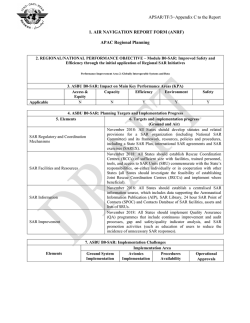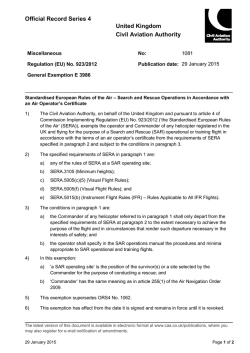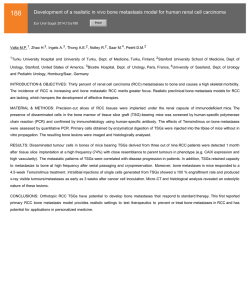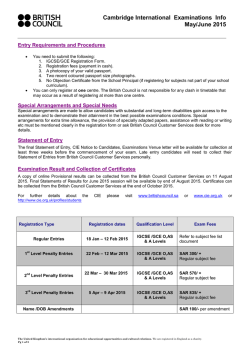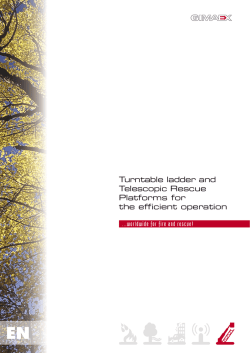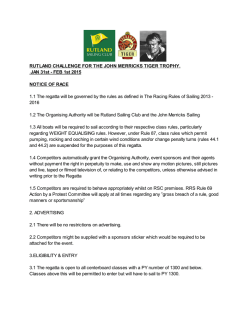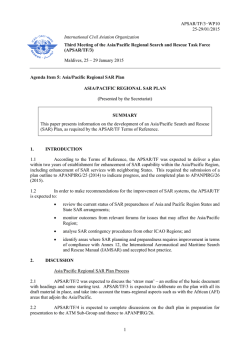
SAR Agreements With Neighbouring States
APSAR/TF/3−WP07 25 – 29/01/2015 International Civil Aviation Organization Third Meeting of the Asia/Pacific Regional Search and Rescue Task Force (APSAR/TF/3) Maldives, 25 – 29 January 2015 Agenda Item 4: Asia/Pacific and inter-regional SAR planning, coordination and cooperation SEARCH AND RESCUE AGREEMENTS WITH NEIGHBOURING STATES (Presented by India) SUMMARY This paper presents the need for establishment of Search and Rescue agreements with the neighbouring States. 1. INTRODUCTION 1.1 There has been a traffic growth centred at Asia Pacific Region resulting in large number of aircraft movements primarily from east to west direction and vice-versa. Though the need for Search and Rescue services agreements had always been necessary for seamless cross-border transit of search assets engaged in SAR activity, there had not been an expected achievement in establishing such agreements. 1.2 The need of agreements with neighbouring countries for cooperation on SAR services under the provisions of the Standards and Recommended Practices is contained in Annex. 12. Also, in the first meeting of the Asia/Pacific Regional Search and Rescue Task Force meeting held in February 2013, it was categorically emphasized that the implementation of SAR Agreements be facilitated as early as possible. The findings regarding the missing MH370/QZ-8501 may further reiterate the importance and essential aspects of agreement between the states. 2. INDIA’S SAR INITIATIVES 2.1 India had taken an initiative to achieve the required cooperation in the region by having established the informal Co-ordination group of BOBASIO (Bay of Bengal, ATS Coordination Meeting, Arabian Sea and Indian Ocean) Region and by conducting regular meetings since 2011. This meeting provides the platform to all the participants of the neighbouring States of India to discuss various issues pertaining to cooperation required between the States. 2.2 There has been significant progress/success in resolving many issues pending with the neighbouring States and thereby ATS coordination LoAs were executed. However there has been little success on SAR LoA cooperation, although the initiatives were taken by India by presenting the draft LOA for discussion so as to arrive at an agreeable template/format for submission to the respective Governments for consideration. The matter was considered important but there had not been significant progress thereafter. 2.3 The Government of India has already established such an arrangement with the Govt. of Bhutan for the cooperation on SAR services. APSAR/TF/3−WP07 25 – 29/01/2015 2.4 It is observed that perhaps due to different administrative set-ups to deal with SAR activities in the neighbouring countries for the purpose of Search & Rescue, the complexity for consolidating the procedures involving all SAR agencies may be the cause for delay in SAR Agreements. In this regard, India proposes to further simplify the process by incorporating new amendments to the initial draft which may result in progress towards the establishment of required SAR agreements and referring to aeronautical SAR agencies. It may be noted that most of the States adjacent to India have common oceanic area without the common land boundaries. This draft LoA is expected to expedite the process for all agencies to further integrate with these cooperation agreements. 2.5 2.6 3. 3.1 India is sharing FIR boundaries with: Nepal and Bhutan over land area; Pakistan, Bangladesh and Myanmar over land and oceanic area; and Malaysia, Maldives, Indonesia, Sri Lanka, Thailand, Oman, Seychelles, Mauritius and Yemen and Somalia. The agreement is expected to broadly cover: critical activities near border areas for rescue operations; identify the resources which are available near the Search and Rescue area; international cooperation at the quickest possible time; sharing of SAR resources; mutual exchange of SAR personnel; and joint exercises both over marine and land areas. ACTION BY THE MEETING. The meeting is invited to: a) review the draft Letter of Agreement (enclosed as Annexure ‘A’) for the cooperation of SAR services with India for Indian FIRs in accordance with the broad areas mentioned in 2.6 and in the spirit of Annex 12; b) take initiatives to formalize the Letter of Agreements on mutually agreed basis to set in motion the requirement of providing SAR services for mutual assistance. The mutually agreed draft LOA to be taken up by the respective countries for their approval; and c) establish working arrangements, within the respective adjacent RCC/RSC’s for effective SAR process, based on Letter of Agreements. Page 2 of 2 APSAR/TF/3−WP07 25 – 29/01/2015 Annexure - A LETTER OF AGREEMENT BETWEEN THE GOVERNMENT OF ______________ AND THE GOVERNMENT OF INDIA FOR THE CO-OPERATION ON SEARCH AND RESCUE SERVICES APSAR/TF/3−WP07 25 – 29/01/2015 Agreement between the Government of _____________ and the Government of India for the Co-operation on Search and Rescue Services. The Government of __________________ and the Government of India (hereinafter referred as the Parties) Recognizing the importance of co-operation in aeronautical search and rescue and the need to ensure expeditious and effective search and rescue services; and Noting the relevant provisions of the Standards and Recommended Practices contained in Annex 12 to the Convention on International Civil Aviation 1944, subject to the legislation of each party, have made the following Agreement: 1. DEFINITIONS AND ACRONYMS For the purposes of this Agreement, an aircraft is considered to be in distress if the aircraft and its occupants are facing, or presumed to be facing, serious and/or imminent danger for which they require immediate assistance. The following definitions shall apply: i. Search and Rescue (SAR): The International Acronym SAR covers all responsibility, activities or means used in the search and rescue of aircraft in distress. ii. Search and Rescue Region (SRR): An area with defined dimensions, associated with a rescue co-ordination centre, within which Search and Rescue Services are provided. iii. Rescue Co-ordination Centre (RCC) : A unit responsible for promoting efficient organization of Search and Rescue services and for co-ordinating the conduct of Search and Rescue operations within a Search and Rescue Region ; iv. Rescue Sub-Centre (RSC) : A unit subordinate to a Rescue Co-ordination Centre established to complement the latter according to particular provisions of the responsible authorities; v. Search and Rescue Unit (SRU): A mobile resource composed of trained personnel and provided with equipment suitable for the expeditious conduct of search and rescue operations. Page A2 of A8 APSAR/TF/3−WP07 25 – 29/01/2015 vi. Alerting Post: Any facility intended to serve as an intermediary between a person reporting an emergency and a rescue coordination centre or rescue sub-centre. Note: In India, the unit associated with the rescue coordination in civil aviation organisation is referred as RCC and unit associated with the rescue coordination in the maritime organisation is referred as Maritime Rescue Coordination Centre (MRCC). 2. IMPLEMENTING AGENCIES/SCOPE OF CO-OPERATION/PREPAREDNESS. The Civil Aviation Authority of __________________ under the Ministry of Civil Aviation and Tourism of the Government of the People Republic of __________________ is the National Search and Rescue (SAR) agency and the Airports Authority of India under the Ministry of Civil Aviation, Government of India is the National Aeronautical Search and Rescue (SAR) co-ordinating agency, which will implement this agreement. For __________________: Contact details: RCC _______________ _____________________ _____________________ _____________________ _____________________ And details of Sub RCC wherever applicable For India: RCC Chennai/Delhi/Kolkata/Mumbai (as applicable) & RSC, Guwahati (as applicable). Contact details: _____________________ _____________________ _____________________ _____________________ 3. Both parties, through their respective RCC/RSC will: 3.1 Promptly and regularly exchange Search and Rescue (SAR) information concerning an actual distress or a potential distress situation; Page A3 of A8 APSAR/TF/3−WP07 25 – 29/01/2015 3.2 Assist each other, to the extent possible, in the conduct of SAR missions in their respective Search and Rescue Regions (SRRs) and across their common SRR boundaries; 3.3 Take appropriate measures for the entry of one’s SAR units into other’s SRR and for the use of the facilities in other’s SRR, while engaged on a SAR mission. 3.4 Exchange information as per agreed periodicity on current SAR resources available to ensure mutual knowledge of each other’s SAR capabilities. 3.5 Conduct communication checks with each other as per agreed periodicity/procedure to ensure the efficiency and effectiveness of SAR communications link. 3.6 Conduct periodic Joint SAR exercise to test their ability to conduct a SAR response across their common SRR region boundary; 3.7 Without prejudicing the ownership of intellectual property and copyright, exchange SAR operational and procedural manuals with ongoing amendments, and from documents, to develop procedures and practices as nearly common as possible. 4. SEARCH AND RESCUE REGIONS 4.1 For the purpose of this agreement, the SRR for ______________ concerns the territory of the People’s Republic of __________________ including territorial waters as well as areas over high seas (as applicable) encompassed by ___________ FIR (as applicable). 4.2 For the purpose of this agreement the SRR for India concerns the territory of the Republic of India including territorial waters as well as areas over high seas encompassed by Chennai/Delhi/Kolkata/Mumbai (as applicable) FIR. Note:- To ensure effective conduct of SAR operations, Rescue Sub Centre (RSC), Guwahati, during the period of its watch, will exercise direct and effective coordination, within the Guwahati Rescue Sub Region, which concerns part of the territory of the Republic of India, encompassed within the Kolkata FIR (if applicable). 4.3 For SAR over the Oceanic Airspace, the respective RCCs shall coordinate by providing details of the missing/affected aircraft with the agencies responsible for providing Search & rescue over the oceanic airspace in their territory. In India SAR over the oceanic airspace is provided by Indian Coast Guard and in __________________ SAR over the oceanic airspace is provided by _________. The Procedures as established between both the agencies, providing SAR over sea, shall be followed. Page A4 of A8 APSAR/TF/3−WP07 25 – 29/01/2015 5. STANDARD OPERATING PROCEDURES FOR THE RESCUE CO- ORDINATION CENTRES The following procedures will be followed: 5.1 Determination of Responsible RCC/RSC. 5.1.1 The responsibility for initiating all subsequent SAR action rests with the RCC and the RSC. The RCC/RSC responsible for SAR action will be determined as follows: 5.1.1.1 When the position of the aircraft needing assistance in distress is known, action will be initiated by RCC/RSC in whose SRR the aircraft is located and this RCC/RSC will remain the responsible RCC/RSC. 5.1.1.2 When the position of the aircraft is unknown, SAR action will be initiated by RCC/RSC which first becomes aware that the aircraft may need assistance. The RCC/RSC initiating a SAR operation will remain in charge of the mission until the responsible RCC/RSC takes over. The responsible RCC/RSC will be either: - The RCC/RSC into whose SRR the aircraft was operating when the last contact was made; or - The RCC/RSC into whose SRR the aircraft was proceeding if the last contact was made on the common SRR boundary. 5.2 Transferring Overall Co-ordination Responsibility or responsibility for the part of a SAR mission 5.2.1 When a transfer of responsibility for overall SAR co-ordination is proposed, either from the subsequent establishment of the aircraft’s position or movement, or because an RCC/RSC other than the one initiating the action is more favourably placed to assume control of the mission by reason of better communications, proximity to the search area, more readily available SAR units or facilities, or any other reason, the following procedures will be adopted: 5.2.1.1 Direct discussions or communications will be conducted between the RCC/RSC concerned, to agree on the best course of action. 5.2.1.2 If it is decided that a transfer of responsibility is appropriate for the whole mission, full details of the previous action taken will be exchanged. Page A5 of A8 APSAR/TF/3−WP07 25 – 29/01/2015 5.2.1.3 The initiating RCC/RSC will retain responsibility until the accepting RCC/RSC formally advises the initiating RCC/RSC that it has assumed responsibility for overall SAR coordination. 5.2.1.4 The same procedure will be followed where the responsible RCC/RSC wishes to transfer responsibility for part of the SAR mission to the other RCC/RSC. 5.3 Entry procedure for SAR units 5.3.1 Each Party will recognize the established interest of the other Party whose aircraft is the subject of, or participating in a SAR mission. Either Party will be notified without delay about any SAR mission by SAR units of the other Party into its search and rescue region to render assistance. 5.3.2 If it becomes necessary for an RCC/RSC to deploy SAR units into the SRR of the other Party, the RCC/RSC will deploy such units for the mission without delay as per the mutually established procedure. Simultaneously the adjacent RCC/RSC will be advised by Situation Reports (SITREPs) in accordance with Appendix I, Volume II of International Aeronautical and Maritime Search and Rescue Manual (IAMSAR), ICAO Doc 9731-AN/958. 5.3.3 The counterpart RCC/RSC will, on receipt, send an acknowledgement to the initiating RCC/RSC and indicate the conditions, if any, under which the intended mission is to be undertaken. All practicable assistance will be rendered to enable the SAR mission to be carried out successfully. 5.4 Liaison during the SAR Mission During the course of a SAR mission, the RCC/RSC concerned will maintain close liaison in order to ensure the smooth and successful execution of the SAR mission. The RCC/RSC responsible for overall SAR co-ordination will keep the other RCC/RSC informed at regular intervals of the number of SAR units involved in the mission, areas to be searched, actions taken to date, on the decision to suspend or terminate the SAR mission. This notification will take the form of situation report (SITREPs) on a regular basis. Direct discussion between the RCC/RSC should be undertaken whenever necessary. Page A6 of A8 APSAR/TF/3−WP07 25 – 29/01/2015 6. USE OF OTHER PARTY’S FACILITIES BY SAR UNITS 6.1 SAR units assigned by the RCC/RSC of the one Party to the other Party which is responsible for overall co-ordination of the SAR mission will be placed under the direction of the relevant RCC/RSC for the period of their state. As far as direct communications are possible, the responsible RCC/RSC will send directly to the SAR unit all instructions and information relative to the operation and the mission requested. The SAR unit will report directly to the responsible RCC/RSC. 6.2 The RCC/RSC of the Party requesting assistance in the form of SAR units or facilities of the other Party will provide all pertinent details of the type and scope of the assistance or facilities required. 6.3 A SAR unit of a Party participating in a SAR operation co-ordinated by the RCC/RSC of the other Party will be authorized to call into appropriate aerodromes of this last Party. The RCC/RSC of this Party will make necessary arrangements including assistance with logistical support, with public services and other bodies to facilitate this call and will transmit any useful information to the unit involved. 7. SAR OPERATIONAL EXPENSES Each [participant/signatory] will fund its own activities in relation to this agreement unless otherwise arranged by the participants in advance, and will not allow a matter of reimbursement of cost among themselves to delay response to any person in danger or distress. 8. RECOVERY OF SUPPLIES AND EQUIPMENT Recovery of re-useable supplies and survival equipment will be arranged between respective RCC/RSC. When practicable, recovered items will be returned to their owners unless other arrangements for their disposal are mutually determined in specific instances. 9. Authorisation to establish separate coordination procedures between Civil Aviation Authority of __________________ ( ) and Ministry of Civil Aviation/Airports Authority of India (AAI) as applicable. 10. AMENDMENTS This Agreement may be amended by mutual consent of the Parties by exchange of letters. Page A7 of A8 APSAR/TF/3−WP07 25 – 29/01/2015 11. SETTLEMENTS OF DISPUTES Any dispute between the Parties arising out of the interpretation or implementation of this agreement shall be settled amicably between the Parties. 12. ENTRY INTO FORCE This agreement will come into effect on signature of both the Parties. 13. TERMINATION Either Party, upon giving the other Party ninety (90) days’ notice in writing may terminate this Agreement at any time. Done at _________________ on _______________ in two originals in English language. ( Secretary, ) ( ) __________________ Ministry of Civil Aviation, ____________________________ For the Government of India. ___________________________ Page A8 of A8
© Copyright 2026
